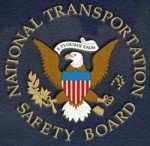But Tells National Press Club That Coverage Is Generally
Good
 NTSB Chair Deborah Hersman
appeared before The National Press Club in Washington, DC Monday,
and gave a generally good assessment of the coverage of the agency,
it's issues, and the accidents it investigates.
NTSB Chair Deborah Hersman
appeared before The National Press Club in Washington, DC Monday,
and gave a generally good assessment of the coverage of the agency,
it's issues, and the accidents it investigates.
Still, Hersman said, since many journalists today are forced to
be "jacks of all trades", there are times when the reporters at an
accident scene "don’t have a full grasp of the subject
matter."
"Of course all of our beat reporters are top notch," Hersman
said, "but occasionally we encounter reporters at the accident
scene who don’t routinely cover transportation issues. Some
of the favorite questions our people have received while on scene
were:
“Who makes 747s besides Boeing?”
“What kinds of planes make those white lines in the
sky?”
We like to say that there are no stupid questions, just stupid
answers, but to be frank, we don’t have the luxury of having
only “transportation experts” cover our work. Since
coming to the Board I have been impressed with the local reporters
who are charged with covering everything from sports to snowstorms
to crash sites. These reporters are very good surrogates for
the public who, although they rely on our transportation system
every day, often have a limited understanding of how it operates
and how safe it is."
Hersman said those general assignment reporters still want to
get the story right, and still ask tough questions, but "I have to
say that it does help both for them and for our purposes to have
some beat reporters there to get the discussion back on track and
really focused on the issues that are central to the accident
investigation."
Hersman also said the very nature of how news is delivered has
changed the way transportation, and aviation, stories, are covered.
"Competition is nothing new in journalism," she said. "In the
old days, newspaper wars were not uncommon. Now that
competitive fervor has moved to cable news, where “If it
bleeds, it leads” has morphed into “If it scares, it
airs.” Can we forget the frenzy this past September 11
involving the Coast Guard’s drill on the Potomac?
And don’t get me started about Balloon Boy."
 Hersman said the 24-hour news cycle
has changed the way the NTSB release information to the media. "Up
until the late 1980s or early 1990s, the NTSB would conduct one
major press briefing a day (at an accident scene), and that would
be in the evening after our progress meeting with all the
investigators," she said. "This meant we wouldn’t
release information until 9pm, which had the practical effect of
being much later for much of the media if the accident was in one
of the western time zones. The next press briefing would be
24 hours later.
Hersman said the 24-hour news cycle
has changed the way the NTSB release information to the media. "Up
until the late 1980s or early 1990s, the NTSB would conduct one
major press briefing a day (at an accident scene), and that would
be in the evening after our progress meeting with all the
investigators," she said. "This meant we wouldn’t
release information until 9pm, which had the practical effect of
being much later for much of the media if the accident was in one
of the western time zones. The next press briefing would be
24 hours later.
Can you imagine if we still held to such a schedule? A
full day of cable news and constant newspaper website deadlines
left to the speculation of talking heads, of former industry
experts or even former government investigators, none of whom have
any direct knowledge of the progress of the investigation."
The NTSB Chair told the National Press Club that the role of the
Board is to disseminate factual information without analysis.
"This would be information that is not subject to change, except in
some minor ways. For example, a train engineer’s years
of service, an airframe or engine’s cycles, the time a
takeoff clearance is given – these facts should not change as
the investigation progresses.
Yes, if we put out raw data without interpretation, this opens
the door for others to provide their interpretation. There is
nothing we can do about that in an open society, and I hope that
most readers or listeners will be able to differentiate between
what the official investigators are saying about an accident and
what observers are opining."
 NTSB Final Report: Rutan Long-EZ
NTSB Final Report: Rutan Long-EZ ANN FAQ: Turn On Post Notifications
ANN FAQ: Turn On Post Notifications Classic Aero-TV: ICAS Perspectives - Advice for New Air Show Performers
Classic Aero-TV: ICAS Perspectives - Advice for New Air Show Performers ANN's Daily Aero-Linx (06.28.25)
ANN's Daily Aero-Linx (06.28.25) Aero-News: Quote of the Day (06.28.25)
Aero-News: Quote of the Day (06.28.25)




